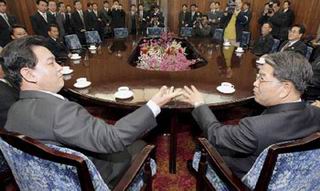World
DPRK, ROK resume ministerial talks
WATCH VIDEO
Source: CCTV.com | 02-28-2007 14:16
 |
South Korea's Unification Minister Lee Jae-jeong (R) and his North Korean counterpart Kwon Ho-Ung talks in Pyongyang Feb. 27, 2007. (Xinhua/Reuters Photo)
 |
South Korean Unification Minister Lee Jae-jeong waves before his departure to North Korea from Seoul Feb. 27, 2007. Talks between the two Koreas' ministers start on Tuesday after seven months of stagnation. (Xinhua/AFP Photo)
The Democratic People's Republic of Korea and the Republic of Korea have resumed ministerial meetings. It is the first high-level reconciliation talks in more than half a year, since the DPRK nuclear test in October.
The talks are expected to pave the way for a resumption of aid to Pyongyang made its commitment to a nuclear-free Korean Peninsula.
Headed by South Korean Unification Minister, Lee Jae-joung, the South Korean delegation arrived in Pyongyang on Tuesday afternoon.
Kwon Ho-ung, the DPRK's chief delegate, greeted the South Korean envoy in the hotel lobby. The two delegation chiefs held a brief meeting before the high level talks began.
Lee Jae-joung said, "I will see to it that the talks will perform very well this time around by carefully moving things forward."
Kwon Ho-ung said, "I think your visit is very meaningful both personally and in the aspect of grabbing a long period of time facing changing circumstances."
During the four-day talks, the two sides are expected to discuss such issues as continuing to implement the North-South Joint Declaration which was signed in June 2000, enhancing inter-Korean cooperation and improving bilateral relations.
It comes after the DPRK showed strong signs of commitment to its pledge at the six-party talks in shutting down its main nuclear reactor within 60 days, in exchange for energy aid.
In Seoul, South Korean President Roh Moo-hyun says it is important to show the DPRK that it will benefit by abandoning its nuclear weapons rather than keeping them.
Roh Moo-hyun said, "The DPRK will keep using the nuclear power if it thinks it's best and it will only decide to abandon its nuclear program if it is more beneficial than having it. Decisions made by the Korean government or US are important for the DPRK to determine which way they will stand."
The DPRK is expected this week to renew its demand for fertilizer and rice aid, and that South Korea will resume such shipments.
Editor:Du Xiaodan



